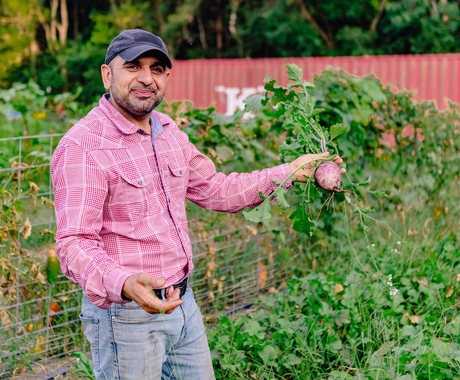By Kate Hansen, former staff member
Farmers and ranchers are incredibly resilient. In many instances, they are used to addressing problems on their own, but there are some challenges we all can use a helping hand to get through.
As 2020 has shown us, some of the most stressful situations are those outside of our control. This year has been unprecedented in so many ways, including the many compounding stressors on producers. But, even before 2020, farm stress rates have been rising for a number of years.
This year started with low prices and bad markets, which was then met with a global pandemic and supply chain disruption. Add on extreme weather, from the drought to the derecho that impacted so many farmers in Iowa. Producers may be getting calls from their bank about a loan payment, or maybe their operation is under financial distress. The amount of stress on farmers and ranchers cannot be understated.
According to New York FarmNet, warning signs of farm stress might include:
- Change in routines: Farmers or members of the farm family may change who attends a market, stop attending regular meetings or religious activities, drop out of other groups, or fail to stop at the local coffee shop or feed mill.
- Decline in the care of domestic animals: Livestock or pets may not be cared for in the usual way.
- Increase in illness: Farmers or farm family members may experience more upper respiratory illnesses (cold, flu) or other chronic conditions (aches, pains, persistent cough, migraines).
- Increase in farm accidents: The risk of farm accidents increases with fatigue or loss of ability to concentrate. Children may be at risk if there isn’t alternative child care.
- Decline in appearance of farmstead: The farm family no longer takes pride in the way farm buildings and grounds appear.
- Decreased interest: Farmers or farm families may be less willing to commit to future activities, sign up for gatherings, or show interest in community events.
More information can be found here.
Experts encourage producers under stress to talk about it with friends, family, or a mental health professional. Other recommended strategies include deep breathing, self-talk, meditating, exercise, food, sleep, and connecting with people in your social network.
With all of the tools and machinery involved in agriculture, a producer’s mental wellness is the most important tool of all.
If you are a farmer dealing with stress, or are a loved one of someone who is, please consider reaching out to a trusted friend or family member, doctor, mental health professional, or any of the resources below. And most importantly, please take care.
If you are in immediate crisis
National Suicide Prevention Hotline: 800.273.8255
Helplines
Farm Aid Hotline
800.FARM.AID (800.327.6243) (Monday to Friday, 8 a.m. to 4 p.m. CT)
Nebraska Rural Response Hotline
imneb.org/imn-programs/farming/rural-response-hotline/
800.464.0258
Your Life Iowa
855.581.8111 (call)
855.895.8398 (text)
Iowa Concern Hotline
800.447.1985
CommUnity Crisis Services
855.325.4296
Online resources
Farm Aid Farmer Resource Network
Farm Aid Resources for Farmers
Iowa Crisis Chat
National Farmers Union Farm Crisis Center
Resources for those with a loved one who might be experiencing stress
The National Farmers Union, Farm Credit, and American Farm Bureau Federation have partnered to present a Rural Resilience Online Course. Registration is free.
Mental Health First Aid training from Iowa State University Extension. Agribusiness professionals, advocates and commodity groups can use the registration code “ADVOCATE” to register for free.





